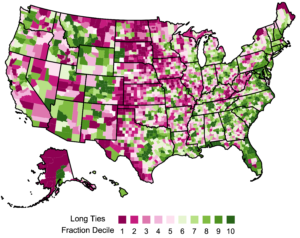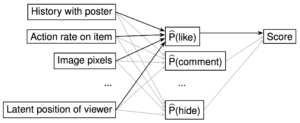Long ties, disruptive life events and economic prosperity. PNAS.
 50 years after Granovetter’s “The Strength of Weak Ties”, we provide new evidence of the connection between network structure and economic prosperity. We also show how life events, like switching high schools, can result in more long ties, even decades later. This paper is accompanied by new public data on the Facebook networks of people in US and Mexican zip codes.
50 years after Granovetter’s “The Strength of Weak Ties”, we provide new evidence of the connection between network structure and economic prosperity. We also show how life events, like switching high schools, can result in more long ties, even decades later. This paper is accompanied by new public data on the Facebook networks of people in US and Mexican zip codes.
Algorithmic transparency and assessing effects of algorithmic ranking. Testimony before the US Senate Subcommittee on Communications, Media, and Broadband.
 This addresses the questions: How does algorithmic ranking in social media work? How can we assess algorithmic impact & amplification? What can policy-makers do here?
This addresses the questions: How does algorithmic ranking in social media work? How can we assess algorithmic impact & amplification? What can policy-makers do here?
Seeding with costly network information. Operations Research.
Because of their position in a social network, some people can be much more influential than others, and so marketers and others often want to target them as “seeds”. But, outside of specific cases, one doesn’t fully observe the social network, but must probe it (with costly surveys or crawling). We develop techniques for selecting good seeds in arbitrary networks while limiting how much we need to probe the network.
Providing normative information increases intentions to accept a COVID-19 vaccine. Nature Communications.
When does sharing information about others’ behaviors cause more of that same behavior? This is both a central question in the social sciences and also important for effecting preventative health behaviors, including vaccination. We use a randomized experiment embedded in the international survey on COVID-19 we conducted with Meta and JHU to address this, providing evidence that these descriptive norms increase intentions to get vaccinated.